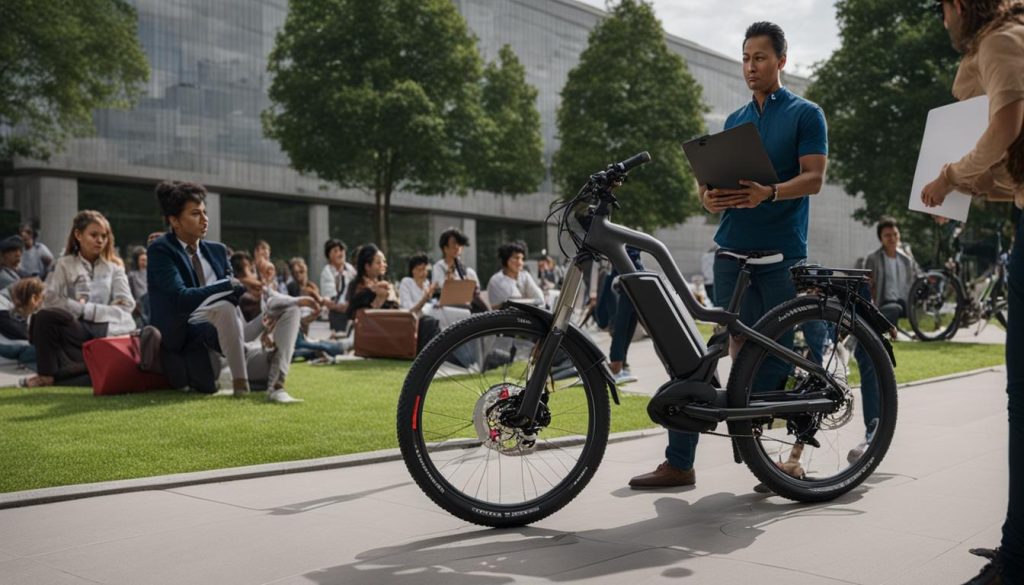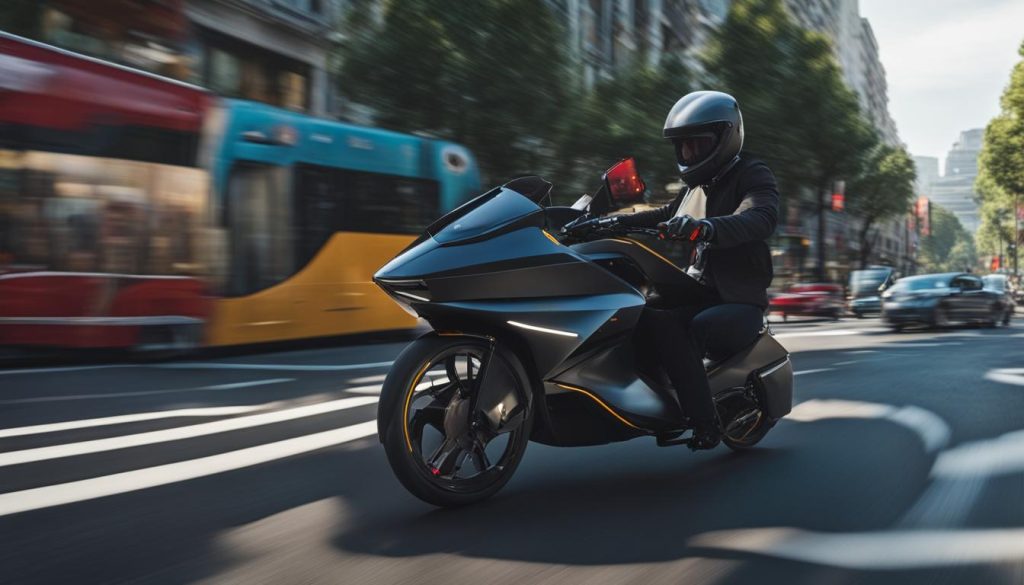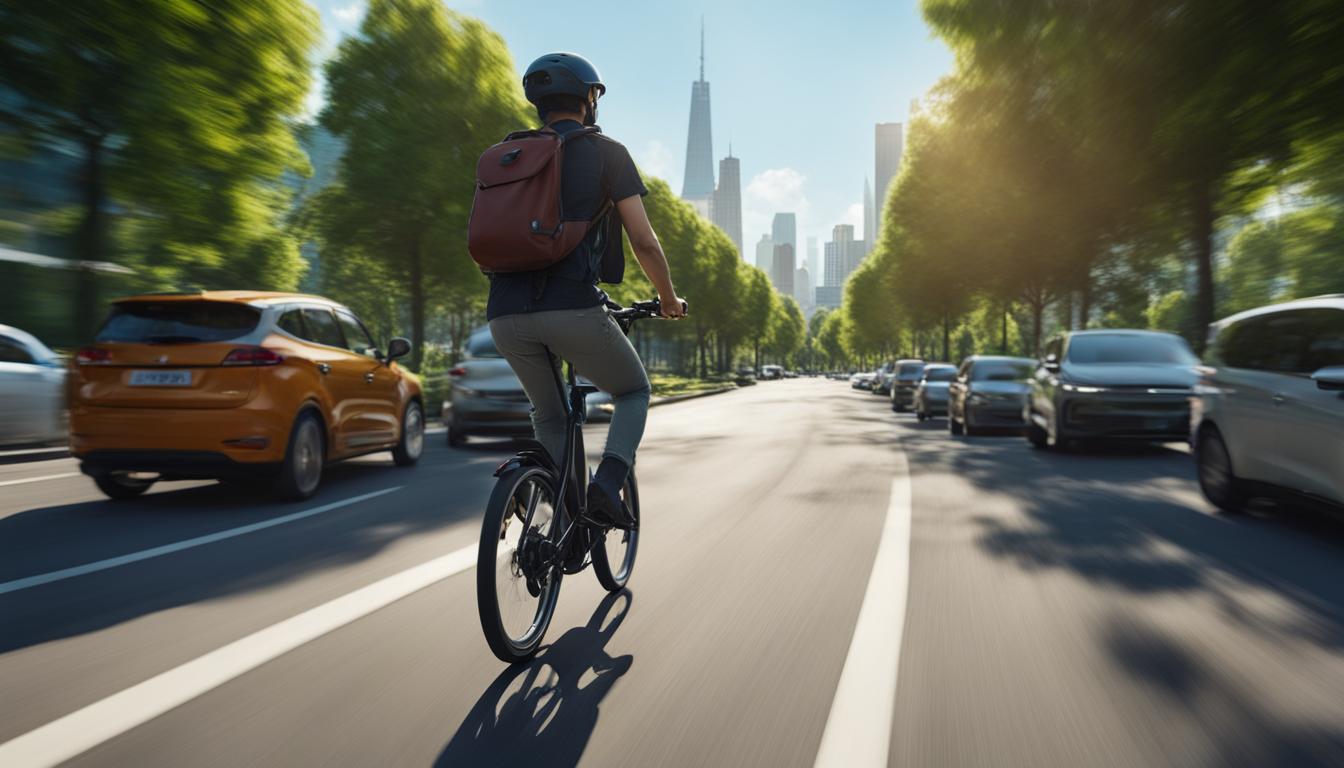Looking for the best electric bicycle that offers numerous benefits? Look no further than electric bicycles, or e-bikes. These innovative modes of transportation are gaining popularity as a solution to reduce auto traffic and air pollution. With their pedal-assist feature and electric motor, e-bikes make cycling easier and more accessible for everyone.
Read More : How to Choose the Right Bicycle Tires for Your Riding Style
Whether you live in a hilly area or simply want a convenient way to commute, an electric bicycle can be your ideal companion. It provides a boost for acceleration, helps maintain speed, and assists in climbing hills. No more worrying about strenuous workouts or physical challenges, an e-bike caters to all needs.
By choosing an electric bicycle, you’re not only benefiting yourself but also the environment. These eco-friendly vehicles reduce greenhouse gas emissions, improve air quality, and help combat the issue of traffic congestion on the roads.
With countless benefits and the potential to transform urban transportation, electric bicycles are becoming the go-to choice for those seeking sustainable, efficient, and enjoyable commuting options.
Key Takeaways:
- Electric bicycles, or e-bikes, are gaining popularity due to their pedal-assist feature and electric motor.
- E-bikes are easier to use, especially in hilly areas or for individuals with physical challenges.
- These eco-friendly vehicles contribute to reduced air pollution and greenhouse gas emissions.
- Electric bicycles help reduce traffic congestion and offer a sustainable alternative to cars for short trips.
- Investing in an electric bicycle promotes a more livable and environmentally friendly urban environment.
State and City Incentives for E-bike Adoption
As the popularity of electric bicycles continues to grow, states, cities, and utilities across the country are implementing incentive programs to encourage e-bike adoption. These programs aim to make e-bikes more affordable and accessible, particularly for low-income residents.
One example of a successful incentive program is the initiative launched by Denver. The city offers rebates for e-bike purchases, including additional funding for cargo bike models. This program has seen tremendous success, with thousands of e-bike purchases supported by the rebates.
Other states and cities, such as Hawaii, Massachusetts, and California, have also implemented similar programs to promote e-bike adoption. By providing financial incentives, these programs make it easier for individuals to purchase e-bikes and embrace this eco-friendly mode of transportation.
| State/City | Incentive Program |
|---|---|
| Denver, Colorado | Rebates for e-bike purchases |
| Hawaii | Vouchers for e-bike purchases |
| Massachusetts | Discounts on e-bike purchases |
| California | Tax credits for e-bike purchases |
These incentive programs not only make e-bikes more affordable but also contribute to the overall goal of reducing air pollution, greenhouse gas emissions, and traffic congestion. By encouraging the use of electric bicycles, states and cities are taking significant steps towards creating a more sustainable and efficient transportation system.

How do e-bike incentive programs benefit the community?
The implementation of e-bike incentive programs has numerous benefits for the community. Firstly, it reduces the number of cars on the roads, resulting in decreased traffic congestion. This, in turn, leads to shorter travel times and improved overall transportation efficiency.
Secondly, e-bikes are an eco-friendly transportation option, as they produce zero emissions. By replacing car trips for short distances, e-bikes contribute to cleaner air and reduced greenhouse gas emissions, improving the overall air quality in cities.
Read More : How to Choose the Right Motorized Bicycle for You
Lastly, e-bike incentive programs make electric bicycles more accessible to a wider range of individuals, including those with lower incomes. This promotes equity and ensures that everyone has the opportunity to benefit from this sustainable mode of transportation.
Micro-Mobility and its Benefits for Urban Transportation
Micro-mobility, which includes e-bikes, e-scooters, and other compact electric vehicles, is revolutionizing urban transportation, offering a host of benefits for individuals and communities. With their battery-powered design, e-bikes provide a convenient and eco-friendly option for commuters, recreational riders, and those seeking an active and sustainable lifestyle.
One of the key advantages of e-bikes is their ability to replace car trips for short distances. By opting for electric cycling instead of driving, you contribute to a significant reduction in traffic congestion, especially during peak hours. The compact size and maneuverability of e-bikes make them ideal for navigating through crowded city streets and parking in limited spaces, offering a hassle-free and time-efficient alternative to traditional transportation modes.
E-bikes also play a crucial role in improving air quality and reducing greenhouse gas emissions. As zero-emission vehicles, they do not release harmful pollutants into the atmosphere, resulting in cleaner air and a healthier environment. This has a direct impact on public health, with reduced rates of respiratory illnesses and pollution-related health problems.
The Advantages of Electric Cycling
- Eco-friendly transportation option
- Reduced traffic congestion
- Improved air quality
- Enhanced maneuverability and parking convenience
- Health benefits
In addition to their environmental benefits, e-bikes offer economic advantages for both individuals and cities. They are more affordable to purchase and maintain compared to cars, making them an attractive option for cost-conscious individuals. For cities, investing in e-bike infrastructure is a cost-effective solution that reduces the need for expensive road maintenance and parking facilities.
With their numerous benefits, e-bikes are transforming urban transportation and paving the way for a more sustainable future. As more individuals embrace electric cycling and cities continue to invest in micro-mobility infrastructure, we can expect to see a significant reduction in traffic congestion, improved air quality, and a shift towards more active and eco-friendly modes of transportation.
| Advantages of E-bikes for Urban Transportation | Impact |
|---|---|
| Reduced traffic congestion | Shorter travel times, improved transportation efficiency |
| Improved air quality | Reduced pollution, decreased rates of respiratory illnesses |
| Convenient maneuverability and parking | Easier navigation through congested streets, reduced space requirements |
| Economic advantages | Lower purchase and maintenance costs compared to cars |
By embracing electric cycling and micro-mobility, we can create more livable and environmentally friendly cities, where individuals can enjoy the benefits of active transportation, improved air quality, and reduced traffic congestion. The future of urban transportation lies in the power of e-bikes and their ability to transform the way we move through our cities.

Conclusion
Electric bicycles have emerged as a promising solution to reduce traffic congestion and air pollution in cities. With the support of state and city incentives, e-bikes are becoming more accessible and affordable for residents. These battery-powered bicycles offer numerous benefits, such as providing eco-friendly transportation, improving air quality, and reducing reliance on cars for short trips.
Micro-mobility, including e-bikes, offers a sustainable and efficient alternative to personal automobiles, contributing to a more livable and environmentally friendly urban environment. By choosing to ride an e-bike instead of driving a car, you can help alleviate traffic congestion and reduce harmful emissions, ultimately improving the quality of air we breathe.
As cities continue to invest in infrastructure and promote the use of e-bikes, the potential to transform urban transportation and create a more sustainable future is within reach. It is our collective responsibility to embrace this mode of transportation, benefiting not only ourselves but also the planet we inhabit. By opting for the convenience and eco-friendliness of electric bicycles, we can actively contribute to a cleaner, healthier, and more enjoyable urban environment.
FAQ
What is an electric bicycle?
An electric bicycle, or e-bike, is a bicycle that has pedals but also utilizes an electric motor to assist riders with acceleration, maintaining speed, and climbing hills.
How are e-bikes different from traditional bicycles?
E-bikes are easier to use than traditional bicycles, especially in hilly areas or for those who may not want a strenuous workout. The electric motor provides assistance, making riding more accessible and enjoyable.
What are the benefits of using an e-bike?
E-bikes offer numerous benefits, including helping people with physical challenges or disabilities, providing an eco-friendly transportation option, reducing reliance on cars for short trips, and contributing to improved air quality and reduced greenhouse gas emissions.
Are there any programs to encourage e-bike adoption?
Yes, many states, cities, and utilities have initiated programs that offer vouchers or rebates to help residents purchase e-bikes. These programs are often paired with efforts to expand bike lanes and cycling corridors.
Which states and cities have implemented incentive programs for e-bike adoption?
Some states and cities that have implemented incentive programs include Denver, Hawaii, Massachusetts, and California. These programs aim to make e-bikes more affordable and accessible, particularly for low-income residents.
What are the benefits of micro-mobility, including e-bikes?
Micro-mobility can reduce traffic congestion, shorten travel times, and improve overall transportation efficiency. E-bikes and other compact electric vehicles are smaller and more maneuverable than cars, making them easier to navigate through congested streets and park in limited spaces. They also contribute to a decrease in air pollution and greenhouse gas emissions.
How do e-bikes save cities money on infrastructure costs?
E-bikes are more affordable to purchase and maintain compared to cars, which reduces the strain on city infrastructure. This allows cities to allocate resources to other important urban initiatives.

